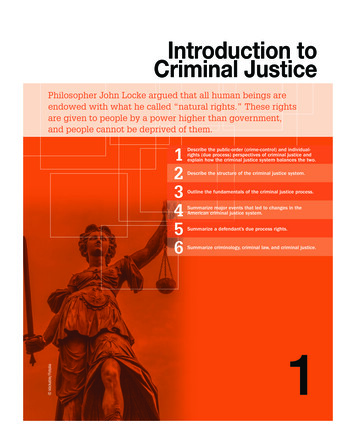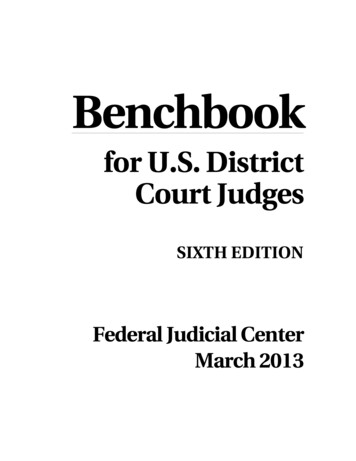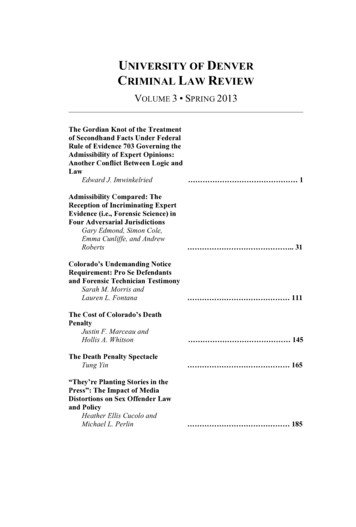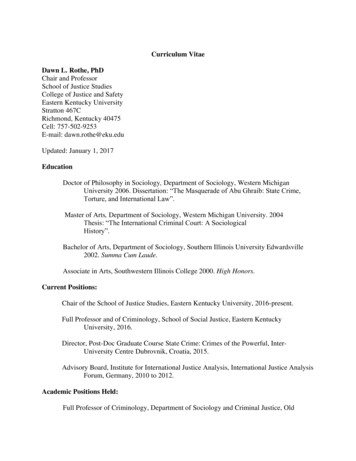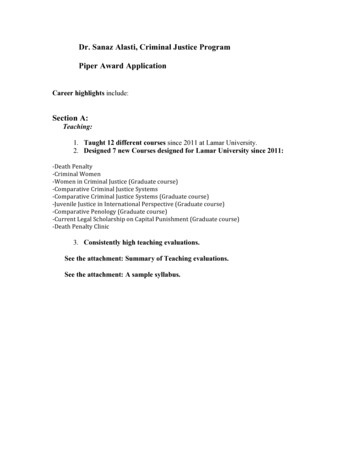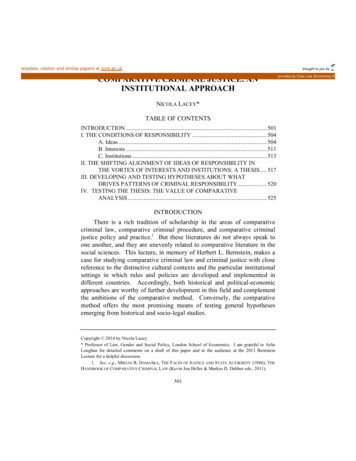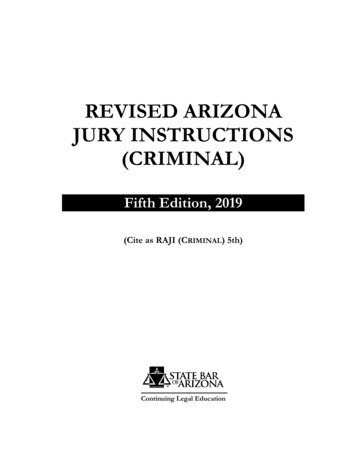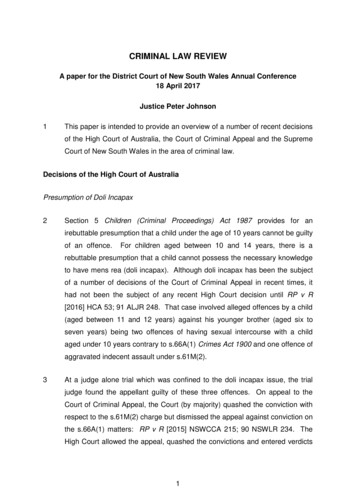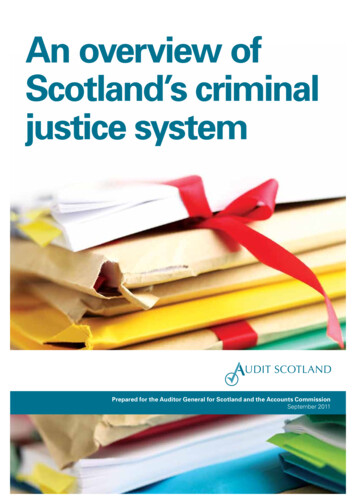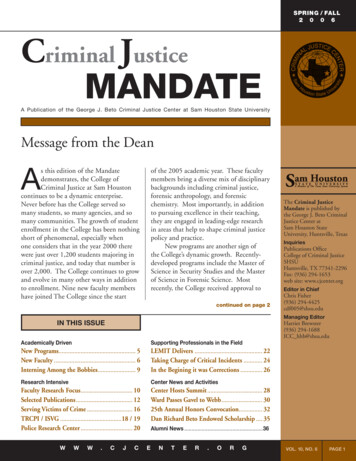
Transcription
Spring / Fall2 0 0 6Criminal JusticeMANDATEA Publication of the George J. Beto Criminal Justice Center at Sam Houston State UniversityMessage from the DeanAs this edition of the Mandatedemonstrates, the College ofCriminal Justice at Sam Houstoncontinues to be a dynamic enterprise.Never before has the College served somany students, so many agencies, and somany communities. The growth of studentenrollment in the College has been nothingshort of phenomenal, especially whenone considers that in the year 2000 therewere just over 1,200 students majoring incriminal justice, and today that number isover 2,000. The College continues to growand evolve in many other ways in additionto enrollment. Nine new faculty membershave joined The College since the startof the 2005 academic year. These facultymembers bring a diverse mix of disciplinarybackgrounds including criminal justice,forensic anthropology, and forensicchemistry. Most importantly, in additionto pursuing excellence in their teaching,they are engaged in leading-edge researchin areas that help to shape criminal justicepolicy and practice.New programs are another sign ofthe College’s dynamic growth. Recentlydeveloped programs include the Master ofScience in Security Studies and the Masterof Science in Forensic Science. Mostrecently, the College received approval tocontinued on page Academically DrivenSupporting Professionals in the FieldNew Programs. 5New Faculty. 6Interning Among the Bobbies. 9LEMIT Delivers . 22Taking Charge of Critical Incidents. 24In the Begining it was Corrections. 26Research IntensiveCenter News and ActivitiesFaculty Research Focus. 10Selected Publications. 12Serving Victims of Crime. 16TRCPI / ISVG.18 / 19Police Research Center. 20Center Hosts Summit. 28Ward Passes Gavel to Webb. 3025th Annual Honors Convocation. 32Dan Richard Beto Endowed Scholarship. 35ww.InquiriesPublications OfficeCollege of Criminal JusticeSHSUHuntsville, TX 77341-2296Fax: (936) 294-1653web site: www.cjcenter.orgEditor in ChiefChris Fisher(936) 294-4425cdf005@shsu.eduManaging EditorIN THIS ISSUEwThe Criminal JusticeMandate is published bythe George J. Beto CriminalJustice Center atSam Houston StateUniversity, Huntsville, TexascjcHarriet Brewster(936) 294-1688ICC hhb@shsu.eduAlumni News.36enter.orgVol. 10, No. 6PAGE
Spring / Fall2 0 0 6C r i m i na lJ u s t i cecontinued from page Dr. WebbDr. Vincent J. Webbwas appointedDean and Directorof the George J. BetoCriminal Justice CenterMay 2006. In that capacity he oversees one ofthe largest academicprograms in criminaljustice in the nation, aswell as a highly integrated center whichincorporates a numberof research and professional training institutes.Webb has held anumber of top administrative positions inleading criminal justiceacademic and researchprograms over his 30year academic career.Prior to acceptinghis former position atSouthern Illinois asDirector of the Centerfor the Study of Crime,Delinquency, andCorrections, Webb wasprofessor of criminaljustice at Arizona StateUniversity West, wherehe developed andimplemented the ArizonaState University Centerfor Violence Preventionand Community Safety.During that time, 19962005, he was also a research consultant to theOffice of the Provost atArizona State UniversityWest (2003-2005)and chairman of theDepartment of CriminalJustice and Criminologythere (1996-2003).PAGE Vol. 10, No. 6offer a Master of Science in VictimServices Management.The College continues to be a leaderin the international arena by offeringstudy abroad experiences in severaldifferent countries and formal exchangeprograms for scholars and practitionerswith universities and agencies in China,Botswana, Korea, and Poland. Theseinternational connections provide studentsand scholars alike with rich educationalexperiences. This past summer theCollege had doctoral students engagedin research internships with ScotlandYard in London, England, and at thesame time hosted 28 students from EastChina Security University who studied theAmerican criminal justice system.One thing that makes criminaljustice at Sam Houston special is ourcontinuing commitment to serving thecriminal justice community through ourtraining, technical assistance, and researchprograms in addition to our undergraduateand graduate degree programs. Thereis no other university that providessuch a comprehensive set of programsand services. The Bill Blackwood LawEnforcement Management Instituteof Texas continues to serve the Statethrough its training programs, as doesthe Correctional Management Instituteof Texas. The Texas Regional Centerfor Policing Innovation is anotherimportant source of cutting-edge trainingand technical assistance for Texas lawenforcement agencies. The Collegeis one of the principal partners in theInternational Law Enforcement Academy,which provides leadership training to lawenforcement officials from across the globe.The College’s research centers continueto be a major part of our enterprise.The Police Research Center, the SurveyResearch Center, and the Crime Victims’M andateInstitute produce important researchproducts that inform criminal justicepolicy and practice. These centers alsoplay an important role in training futuregenerations of researchers, and mostimportantly, they help to integrate theresearch, teaching, and service componentsof the College’s mission.Much of the success of the College andits students is due to the generous supportof alumni and friends, and over the yearshundreds of students have benefited fromthis generosity. This investment in theCollege and its students has paid dividendsto communities through Texas and thenation as a result of their professionalefforts to provide justice and public safety.Sincere thanks to all who have providedthe College with financial support.I hope you enjoy finding out moreabout the College as you read throughthe pages of this edition of the Mandate.Our goal is to keep you informed aboutCriminal Justice at Sam Houston andto use the Mandate to keep alumni andfriends connected. Please keep in touch,and I look forward to bringing you newsabout the College in the future.
C r i m i na lJ u s t i ceM andateCriminal Justice CenterManagement TeamSpring / Fall2 0 0 6Webb cont.Previously he was chairman of the Departmentof Criminal Justice at theUniversity of Nebraskaat Omaha (1975-1980;1981-1996) and directorof the Center for AppliedUrban Research there(1980-1986).His academic specialties include: criminaljustice policy analysisand evaluation research,police studies, violenceprevention, and criminaljustice planning.(Seated from left to right) William W. Johnson –Associate Dean; Kristi Kreier – Directorof Budget & Finance; Vincent J. Webb – Dean and Director; Debra McCall – Assistantto the Dean; Glen Kercher – Executive Director, Crime Victims’ Institute; (Standingfrom left to right) Douglas Dretke – Executive Director, Correctional ManagementInstitute of Texas; Janet Mullings – Associate Dean; and Rita Watkins – ExecutiveDirector, Law Enforcement Management Institute of Texas.Webb’s current researchinterests involve gangs,human trafficking andsex offender residential policy studies.His extensive “PoliceResponse to Gangs”study and research hasculminated in a bookwith co-author, CharlesM. Katz, Policing Gangsin America, publishedby Cambridge UniversityPress (2006). Their bookdescribes the assumptions, issues, problems,and events that characterize, shape, and definethe police response togangs in America today.The focus of the book ison the gang unit officersthemselves and theenvironment in whichthey work. A discussionof research, statisticalfacts, theory, and policywith regard to gangs,gang members, andgang activity is used asa backdrop.Webb serves as anAssociate Editor forJustice Quarterly and isa past president of theAcademy of CriminalJustice Sciences. Vol. 10, No. 6PAGE
Spring / Fall2 0 0 6Study AbroadC r i m i na lTEnrollment TrendsThere is no doubt that the events of9/11 impacted enrollment trends ofcriminal justice programs nationwide; enrollment at SHSU’s College ofCriminal Justice increased 85%. The graduate and Ph.D. programs have always beenstrong, experienceing steady increases since2001. Since the first Ph.D. was awardedin 1973, over 200 students have receivedtheir doctoral degrees. But, the real influxof students over the last five years was atthe undergraduate level, where enrollmentsincreased by 100%. Through its StudyAbroad Program, SHSUstudents have the opportunity to view othercriminal justice systemsin foreign countries.“As the world becomessmaller and we dealwith issues such asthose we have facedsince 9/11, we need tounderstand how criminaljustice systems operatethroughout the world,”said Carolyn Martinez,coordinator of theprogram. “The StudyAbroad Program givesour students the opportunity to learn aboutdifferent systems and tobring their knowledgeback to their classesto share with otherstudents.”“We will likely continue to experience a steady growth trend at theundergraduate level. Much of ourstrategic focus in the coming yearswill be to strengthen and grow ourgraduate programs.”— Dean WebbDegree Programs PAGE Vol. 10, No. 6M andateAcademically Drivenhe College ofCriminal Justiceat Sam HoustonState University hasone of the strongestinternational relationship networks in theUnited States for placing students in uniqueoverseas learning opportunities.“Every year we sendmore than 50 studentsto study abroad, wherethey live at policeuniversities and trainingcenters and learn fromleading scholars andpolice officials aboutthat country’s political,justice, social, and economic systems,” saidMartinez. J u s t i ceSam Houston State Universitynamed one of the“Best in the West”by Princeton Review.The Doctor of Philosophy in Criminal JusticeThe Master of Arts in Criminal Justice and CriminologyThe Master of Science in Criminal JusticeThe Master of Science in Criminal Justice Leadership and Management:Online Option, Weekend Option, or Evening OptionThe Master of Science in Forensic ScienceThe Master of Science in Security StudiesBachelor of Arts and Bachelor of Science in Criminal JusticeBachelor of Arts in Victim Studies
C r i m i na lJ u s t i ceM andateSpring / Fall2 0 0 6New ProgramsDeveloping solid academic programs in emerging areas of need is one of the mostimportant roles the College of Criminal Justice plays. It is no surprise that thetwo newest programs are the Master of Science in Security Studies, which enrolled its first class of students Fall 2006, and the Master of Science in Forensic Science,which was initiated Fall 2001.Master of Science in Security StudiesMaster of Science in Forensic ScienceToday’s global business environmentdemands a more highly-trained security professional, particularly those inmanagerial and leadership positions. Withterrorism in the forefront, the securityprofessional is tasked with assuming rolesthat earlier were almost exclusively in thegovernmental arena.This specialized degree program hasbeen designed to produce professionalsprepared to meet the unique new requirements of the criminal justice system andhomeland security. The broad educationobjective is to develop managers andleaders who possess expertise in both thetheoretical and experiential dimensions ofsecurity management.“The protection of assets in proprietarymissions is paramount to the success of anycompany,” commented Jim Dozier, program coordinator. “Our Master’s Degree inSecurity Studies is a step forward in equipping the professionals in this growing fieldto meet those essential needs.” Over the past decade, employment inthe forensic science sector has grown at anunprecedented rate due to the increased reliance on forensic techniques by law enforcement agencies. The Master of Science inForensic Science is a specialized, professionaldegree designed for students, professionals,or existing practitioners who want to furthertheir knowledge in this area. In the forensicscience fields, a graduate degree is rapidlybecoming the standard of training requiredfor advancement into leadership positions.“We’ve worked on fine tuningthe curriculum this past year,”commented Dr. Sarah Kerrigan,program coordinator. “Forensicscience courses are designedto provide both classroom andlaboratory exposure to the field ofcriminalistics, forensic toxicology,pattern evidence, and forensicanthropology. Emphasizing thedevelopment of problem-solvingabilities, the curriculum encouragesconcentration in at least one forensicscience specialty area and exposes studentsto both relevant laboratory techniques andmedico-legal developments.”Graduate students in this programalso have access to state-of-the-art facilities and laboratories containing analyticalinstrumentation and equipment that arecommonly found in crime laboratories.Working with all the tools of the trade,including DNA analyzers and gas chromatography/mass spectrometry (GC/MS),is key to a successful career in a public orprivate sector forensic science laboratory. Enlightened byEnronPresiding Judge SimsLake of the Enron trialcourt made arrangements to bring SHSUCriminal Justice studentsto the notorious andmuch-publicized EnronTrial in Houston, Texas.The group was met byDeputy U.S. MarshalMarianne Matus, aSam Houston StateUniversity CriminalJustice alumna. TheBearkat connection wastruly at work, as it wasevident to the studentsthey were receivingspecial VIP treatment.Most students hadnever attended an actual trial before.Afterwards, thestudents were privyto a private meetingwith a group of FBI,IRS, and undercoveragents who had workedthe case. The agentssuggested classeswhich would be mostbeneficial to them, andthey left the courthousemore determinedabout their futuregoals and aspirations.Unequivocally, thisEnron experienceprovided muchenlightenment to ourstudents. Vol. 10, No. 6PAGE
Spring / Fall2 0 0 6C r i m i na lJ u s t i ceM andateNew Faculty ProfilesDr. BythewayDr. Joan A. Bytheway, Assistant ProfessorDr. Howard Henderson, Assistant ProfessorForensic anthropologist, Dr. JoanBytheway, joined the faculty of theCriminal Justice Center September 2006 insupport of the growing graduate degree program in forensic science. Bytheway comesfrom California University of Pennsylvaniawhere she served as adjunct faculty in theDepartment of Anthropology. More recently, she worked as a forensic anthropologistand lab analyst investigating mass gravesin Baghdad, Iraq. Bytheway received herPh.D. and B.A. in Physical Anthropologyfrom the University of Pittsburgh.Dr. Henderson began researchingcriminal justice issues in 1999 at TennesseeState University, where he received theMinority Graduate Academic ScholarAward. His thesis examined the over-representation of African Americans in stateprison institutions. While completinghis master’s degree, he was employed byChildren’s Comprehensive Services as acase manager working with juvenile sex offenders and conduct-disordered offenders.Upon completion of his master’sdegree, Henderson was accepted into thecriminal justice doctoral program at SamHouston State University, where he specialized in criminal justice administration.While in the doctoral program, he workedas a full-time community supervision officer in Walker County, Texas. His dissertation examined the predictive utility ofthe Wisconsin Risk Needs Assessment inpredicting the post-probation recidivism ofsuccessful probationers.Henderson’s principal research interestsinclude offender risk needs assessments,community corrections, correctional management, police-minority relations, and theunintended consequences of drug policy.He recently completed an analysis ofprobationer internet reporting in LibertyCounty, Texas.Henderson earned his Ph.D. inCriminal Justice from Sam Houston StateUniversity (2006).Dr. Jim Dozier, Associate Professor andCoordinator of the Master of Science inSecurity StudiesDr. DozierDr. HendersonPAGE Vol. 10, No. 6Dr. Dozier was appointed AssociateProfessor Fall 2006. Drawing on his 38year professional career in local, state, andfederal law enforcement, he specializes inPolicing, Law, and Security. Dozier alsoserves as coordinator of the College’s newgraduate program in security studies.Dozier most recently servedas Executive Director of the TexasCommission on Law Enforcement(TCLEOSE). During his professionalcareer, he has been a Houston Police officer and a Special Agent with the D.E.A.He also served as the Montgomery CountyAttorney (1985-1992) and AssistantDistrict Attorney for the 9th JudicialDistrict (1982-1984, 1992-1994).Dozier is a Member of the Federal LawEnforcement Training Accreditation Boardof Directors.Dozier earned his Ph.D. in BehavioralScience from the University of Texas, HSCHouston (1996) and his J.D. from SouthTexas College of Law (1982).
C r i m i na lDr. Sarah Kerrigan, Associate Professor andInterim Coordinator of the Master of Sciencein Forensic ScienceDr. Sarah Kerrigan joined The CollegeSpring 2006 as a member of the facultyand became the interim coordinator ofthe forensic science graduate programFall 2006. She also maintains a forensictoxicology consulting practice in Houston,Texas. Prior to this, she was the ToxicologyBureau Chief at the Scientific LaboratoryDivision in New Mexico, where she wasresponsible for the breath alcohol program,criminal casework, and medical examinercasework statewide.Kerrigan earned her Ph.D. inChemistry from the University of BritishColumbia, Vancouver, Canada, and hastaught numerous courses on interpretivetoxicology, alcohol, and drug-impaireddriving. She currently serves on the facultyof the National Judicial College.Kerrigan is Past President of theCalifornia Association of Toxicologists andcurrently serves on the Board of Directorsof the Society of Forensic Toxicologists.Her involvement with the AmericanAcademy of Forensic Sciences includes:Chair, Awards and Scholarship Committee(Toxicology Section) and Chair, Drugs andDriving Committee (Society of ForensicToxicologists). She serves on the editorialadvisory board of the Journal of AnalyticalToxicology and is Past Chair of Clinicaland Forensic Toxicology News, a publication of the American Association forClinical Chemistry.Kerrigan is a member of the AmericanAssociation for Clinical Chemistry, Societyof Forensic Toxicologists, CaliforniaAssociation of Toxicologists, AmericanAcademy of Forensic Sciences, and TheInternational Association of ForensicToxicologists.J u s t i ceM andateSpring / Fall2 0 0 6Dr. Scott Menard, ProfessorDr. Menard joined the facultyof the College of Criminal Justice in2006. His areas of academic interest include: Statistics (LongitudinalResearch, Logistic Regression Analysis,Multilevel Analysis), Research Methods(Survey Research, Evaluation Research),Juvenile Delinquency, and Life CourseCriminology (Victimization, SubstanceUse, Theory Testing).An experienced researcher, Menard hasserved as the Principal Investigator on over 3 million in federally-funded researchprojects. His currently-funded projectsinclude “Evaluation of the Bully-ProofingYour School Program,” an evaluation of aschool-based, curriculum-driven programfor reducing bullying and other forms ofschool violence, funded by the NationalInstitute of Justice; and “Inhalant AbuseAcross Generations in a National Sample,”a project which examines inhalant abuseand related behaviors in the NYSFS developmentally and intergenerationally.Menard has published in the areas ofboth statistics and criminology, includingarticles on logistic regression analysis, andmonographs on logistic regression andlongitudinal research. His publications inthe area of criminology include papers ontheory testing in crime and delinquency,the relationship of substance use to crimeand delinquency, and papers on repeatvictimization and the consequences ofviolent victimization. Recent or pendingpublications include a coauthored book onyouth gangs, and a coauthored book onthe impact of neighborhood characteristicson family, school, peer groups, problembehavior, and prosocial development.Menard earned his Ph.D. in Sociologyfrom the University of Colorado (1981).Dr. KerriganDr. Menardcontinued on page Vol. 10, No. 6PAGE
Spring / Fall2 0 0 6C r i m i na lJ u s t i ceM andatecontinued from page Dr. Melissa Tackett-Gibson, AssistantProfessorDr. Tackett-GibsonDr. Tackett-Gibson was appointedAssistant Professor in the College ofCriminal Justice Fall 2006. Her specialty areas include Drug Use and Abuse,Organizations and Evaluation, andQualitative Methodologies. She teachesCriminology and Courts as Organizations.Tackett-Gibson is currently developing a study of drug use, mental health, andhigh-risk behaviors among residents inthe most highly-populated areas of Texas.This follows a similar study of drug andalcohol use among college students in thestate. The later survey was conducted forthe Department of State Health Services,Substance Abuse Division and with thePublic Policy Research Institute at TexasA&M, where she had served as AssistantResearch Scientist since 2002.Tackett-Gibson is preparing an articlefrom that survey contrasting prescriptiondrug abusers from individuals who abuseother types of substances. She is also examining the impact of mixed-mode surveyadministration on the collection of data onsensitive topics, such as drug use.Tackett-Gibson earned her Ph.D. inSociology from Northeastern University(2002).Dr. Michael S. Vaughn, ProfessorDr. VaughnPAGE Vol. 10, No. 6Dr. Mike Vaughn joined the College ofCriminal Justice at Sam HoustonState University in May 2006. Priorto that, he was Professor of CriminalJustice at Georgia State University from1993 to 2006. He has served as BookReview Editor of the Journal of CriminalJustice Education (1993-1996), Editor ofPolice Forum (1997-2001), Editor of theCriminal Justice Review (2001-2005), andEditor of the International Criminal JusticeReview (2001-2005).Vaughn’s research interests are primarily related to legal issues in criminal justice,specializing in the area of legal liabilities ofcriminal justice personnel.He is currently involved in research examining dental and medical care availableto inmates in correctional facilities, as wellas criminal justice managerial breakdownand collapse in high-profile situations.Vaughn has been recognized inMarquis Who’s Who in American Law,Who’s Who in the World, Who’s WhoAmong America’s Teachers, and Who’sWho in America. Vaughn earned his Ph.D.in Criminal Justice from Sam HoustonState University (1993).
C r i m i na lJ u s t i ceM andateInterning among the BobbiesSubstantial value is added to the SHSUacademic experience through vast internship and study abroad opportunities. Asignificant number of federal, state, andlocal government agencies as well as privatecompanies seek our student talent to fillinternship positions in Adult Correctionsand Probation, Juvenile Corrections, LawEnforcement, Legal Agencies, and variousSupport and Victim Service Agencies, aswell as a growing number of internationalopportunities.O“It was an opportunity of alifetime.”— Michael Bozeman“It was a genuine opportunityto observe one of the world’stop agencies in action, furthermotivating me toward myfuture goals.”— Laura BarrettMichael Bozeman, a retired Houstonhomicide detective and Ph.D. student,and Laura Barrett, who began work onher Ph.D. this fall, recently returnedfrom a summer research internship inthe Specialist Crime Directorate of theMetropolitan Police Service (MPS), NewScotland Yard, London. New ScotlandYard serves as the headquarters for theMPS, as well as the center for all of theirspecialized investigative/detective units.Spring / Fall2 0 0 6Bozeman and Barrett plan to returnin January to present to the New ScotlandYard Senior Management Team the findings of their joint research focusing onViolent and Serious Crime within distinctethnic communities. “Michael and Laura’s outstanding work has nowled us to formal discussions about creating amemorandum of understanding for an annualresearch fellowship with the New Scotland Yard,London.”— Dr. James Barrum, coordinator ofthe internship programsver 100 studentscompleted internships this yearin 72 different agencies.Undergraduates typicallygain the much neededon-the-job training andwork experience, whilegraduate and Ph.D. students are encouraged topursue relevant researchexercises that contributeto decisions concerningcrime control strategies.Texas Department ofCriminal Justice USAttorney General US Postal Inspectors Drug EnforcementAdministration USImmigrations andCustoms Enforcement FDIC White HouseSecurity TexasAttorney General Federal Bureau ofAlcohol, Tobacco,Firearms and Explosives FBI US SecretService Texas DPS Office of the InspectorGeneral TABC INTERPOL MADD YMCA Casa Shelter Pentagon ForceProtection Agency Texas Youth Commission Target US MarshalsService County CrimeLabs Air SecurityInternational Juvenileand Adult Correctionsand Probation Agencies Federal, State, andLocal Law EnforcementAgencies LegalServices Departmentof Homeland Security- ICE San Antonio Victim Services Agencies Texas Parks andWildlife Vol. 10, No. 6PAGE
Spring / Fall2 0 0 6C r i m i na lJ u s t i ceM andateResearch IntensiveFaculty Research FocusRDr. Mullingsarely does the academician get unfettered access to all thedocumentation surrounding an abduction, murder investigation, trial, execution, and life after for the victim. PauletteEverett-Norman was the mother of McKay Everett, who at 12years old was kidnapped, held for ransom, and murdered by HiltonCrawford, a longtime family friend. Paulette kept all the documents and records she could get her hands on from the investigationthrough the trial. She then shared her story and her experience withDr. James W. Marquart and Associate Dean Janet L. Mullings. WhileAmericans today know more about the criminal justice system thanever before, they know little about victims and the ripple effects that course through oursociety as a consequence of crime.The telling of a crime story from the perspective of the victim from beginning to endis rare. Typically, the focus is on crimes, criminals, the investigation, and trial. For Drs.Marquart and Mullings, who have studied crime and criminals for over 20 years, thiswas an opportunity to examine a wide variety of issues that written research has failed touncover — one account of how a victim’s case from her perspective traversed the entirecriminal justice system, from the moment of the crime through surviving the violentcriminal event. Deadly Betrayal is being published by The Texas Review Press and isscheduled for release in 2007. Dr. Jennifer L. Schulenberg, AssistantProfessorDr. SchulenbergPAGE 10Vol. 10, No. 6Dr. Jennifer Schulenberg joined theCollege in 2005. She specializes in policing (use of discretion, decision making,and specialized units), social control, policy analysis, juvenile delinquency, community-based corrections, and researchmethodology (quantitative, qualitative,and mixed methods).Schulenberg’s current research focus ison the effect of legislative change on policebehavior, decision-making processes of specialized juvenile police officers, and understanding the use of formal social controlin general when dealing with criminal anddeviant behavior.Schulenberg is Associate Editor ofthe Canadian Journal of Criminologyand Criminal Justice (2004-present). Shereceived the 2004 Governor General’sAcademic Gold Medal (June 2005) andthe Social Sciences and HumanitiesResearch Council Post-DoctoralFellowship (2004-2005) in support of herwork, “The Effect of Family Structure andDynamics on Police Decision-making withYouth.” Shulenberg earned her Ph.D. inSociology from the University of Waterloo(2004).
C r i m i na lJ u s t i ceM andateSpring / Fall2 0 0 6Dr. Victoria Brewer Titterington, Associate ProfessorDr. Titterington (known as “Dr. T.”to her students) is currently an AssociateProfessor in the College of CriminalJustice. Along with a Ph.D. in Sociology,Titterington holds master’s degrees insocial work and business administration.Her pre-academic professional experienceincluded clinical and administrative positions in community mental health, as wellas corporate training and consulting.Titterington’s academic research has focused upon homicide, particularly intimatepartner killing, health conditions of femaleprisoners and, most recently, the intersection of crime and aging. Her work has appeared in the Journal of Research in Crimeand Delinquency, Violence and Victims,Homicide Studies, and Gender and Society.Titterington has been a member ofthe Homicide Research Working Groupsince 1992 and has served the organization in several capacities, includingSecretary and Vice President. In addition,she has conducted homicide research inresidence at the Max Planck Institute forForeign and International Criminal Lawin Freiburg, Germany.Titterington is presently a ResearchPartner for the federal Project SafeNeighborhoods Program, and has since1996, served as a technical assistance consultant to the National Institute of Justice.She earned her Ph.D. in Sociology fromTulane University (1995). Dr. TitteringtonSouthwest Journal of Criminal Justice has New HomeDrs. Wesley Johnson and Willard M. Oliver were recently named co-editors of theSouthwest Journal of Criminal Justice (SWJCJ) — the official journal of the SouthwesternAssociation of Criminal Justice, which was previously hosted by Texas State University.In April 2006 the SHSU Co
University, Huntsville, Texas Inquiries Publications Office College of Criminal Justice SHSU Huntsville, TX 77341-2296 Fax: (936) 294-1653 . International Law Enforcement Academy, which provides leadership training to law . and the Master of Science in Forensic Science, which was initiated Fall 2001. Master of science in security studies
